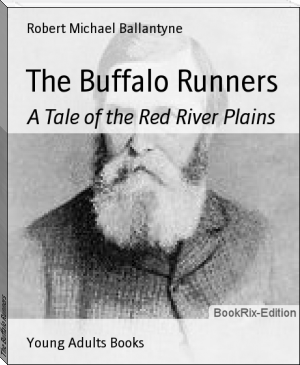The Buffalo Runners, Robert Michael Ballantyne [best fiction novels of all time .txt] 📗

- Author: Robert Michael Ballantyne
Book online «The Buffalo Runners, Robert Michael Ballantyne [best fiction novels of all time .txt] 📗». Author Robert Michael Ballantyne
At this the father smiled benignly, but Slowfoot made a demonstration which induced a rather prompt completion of the walk without a reasonable wage. It sucked vigorously all the time, however, being evidently well aware that Francois was not to be feared.
At that moment the curtain of the tent lifted, and little Bill Sinclair limped in. He was a favourite with La Certe, who made room for him, and at once offered him the pipe, but Billie declined.
"No, thank you, La Certe. I have not learned to smoke yet."
"Ha! you did not begin young enough," said the half-breed, glancing proudly at his own offspring.
We may explain here once for all that, although he had lived long enough in the colony to understand French, Billie spoke to his friend in English, and that, although La Certe understood English, he preferred to speak in French.
"What have you been doing?" he asked, when the boy had seated himself.
"I've been shooting at a mark with my bow and arrow--brother Archie made it for me."
"Let me see--yes, it is very well made. Where is brother Archie?"
"Gone after the buffalo."
"What!--on a horse?"
"He could not go very well after them on foot--could he?" replied the boy quietly. "Dan Davidson lent him a horse, but not a gun. He said that Archie was too young to use a gun on horseback, and that he might shoot some of the people instead of the buffalo, or burst his gun, or fall off. But _I_ don't think so. Archie can do anything. I know, for I've seen him do it."
"And so he has left you in camp all by yourself. What a shame, Billie!"
"No, Francois, it is not a shame. Would you have me keep him from the fun just because I can't go? _That_ would indeed be a shame, wouldn't it?"
"Well, perhaps you're right, Billie."
"I know I'm right," returned the boy, with a decision of tone that would have been offensive if it had not been accompanied with a look of straightforward gentleness that disarmed resentment. "But, I say, Francois, why are you not out with the rest?"
"Oh, because--because--Well, you know, my horse is tired, and--and, I'm not quite sure that the buffalo really have been seen as near as they say. And I can go to-morrow just as well. You see, Billie, there is no need to hurry oneself."
"No, I don't see that. I think there's always need for hurry, specially with men like you. I know the reason you don't go out better than yourself, Francois."
"Yes--what is it?" asked the half-breed with a slight laugh.
"It's laziness. That's what it is, and you should be ashamed of yourself."
The large mild eyes and low voice, and pale earnest face of the plain-spoken invalid were such that it would have been impossible for any one to be offended with him, much less La Certe, whose spirit of indignation it was almost impossible to arouse. He winced a little at the home-thrust, however, because he knew it to be true.
"You're hard on me, Little Bill," he said with a benignant look, as he picked a stick from the fire and inserted its glowing end in his pipe.
"No, I'm not hard," returned the boy gravely. Indeed he was always grave, and seldom laughed though he sometimes smiled faintly at the jokes and quips of his volatile brother and Fred Jenkins the seaman: "I'm not half hard enough," he continued; "I like you, Francois, and that's the reason why I scold you and try to get you to mend. I don't think there's such a lazy man in the whole Settlement as you. You would rather sit and smoke and stuff yourself with pork all day than take the trouble to saddle your horse and get your gun and go out with the rest. Why are you so lazy, Francois?"
"I'm sure I don't know, Little Bill, unless it be that I'm born to be lazy. Other people are born, I suppose, to be active and energetic. They like activity and energy, and so they do it. I like repose and quiet, and--so I do that. Not much difference after all! We both do what we like best!"
Little Bill was perplexed. Although philosophical in tendency he had not had sufficient experience in sophistical reasoning to enable him to disentangle the sinuosities of bad logic. But he was a resolute little fellow, and not easily quelled.
"What would happen," he asked, "if everybody in the world did as you do?"
"Well, I suppose everybody would enjoy themselves. There would be no more fightings or wars, or any trouble of that sort, if everybody would only take things easy and smoke the pipe of peace."
"Hm! I don't know about that," returned the boy, doubtfully; "but I'm quite sure there would not be much pemmican in Red River this winter if all the hunters were like you. I wonder you're not ashamed, Francois. Sometimes I think that you're not worth caring about; but I can't help it, you know--we can't force our likings one way or other."
La Certe was a good deal taken aback. He was not indeed unaccustomed to plain speaking, and to the receipt of gratuitous abuse; but his experience invariably was to associate both with more or less of a stern voice and a frowning brow. To receive both in a soft voice from a delicate meek-faced child, who at the same time professed to like him, was a complete novelty which puzzled him not a little.
After a few minutes' profound consideration, he put out his pipe and arose quickly with something like an appearance of firmness in his look and bearing.
Slowfoot, whose utter ignorance of both French and English prevented her understanding the drift of the recent conversation, was almost startled by the unfamiliar action of her lord.
"Where go you?" she asked.
"To follow the buffalo," answered La Certe, with all the dignity of a man bursting with good resolutions.
"Are you ill?" asked his wife, anxiously.
To this he vouchsafed no reply, as he raised the curtain and went out.
Little Bill also went out, and, sitting down on a package, watched him with his large solemn eyes, but said never a word until the half-breed had loaded his gun and mounted his horse. Then he said: "Good luck to you, Francois!"
La Certe did not speak, but with a grave nod of his head rode slowly out of the camp. Little Bill regarded him for a moment. He had his bow and a blunt-headed arrow in his hand at the time. Fitting the latter hastily to the bow he took a rapid shot at the retreating horseman. The arrow sped well. It descended on the flank of the horse with considerable force, and, bounding off, fell to the ground. The result was that the horse, to La Certe's unutterable surprise, made a sudden demivolt into the air--without the usual persuasion--almost unseated its rider, and fled over the prairie like a thing possessed!
A faint smile ruffled the solemnity of Little Bill at this, but it vanished when he heard a low chuckle behind him. Wheeling round, he stood face to face with Slowfoot, whose mouth was expanded from ear to ear.
"Clever boy!" she said, patting him on the back, "come into the tent and have some grub."
She said this in the Cree language, which the boy did not understand, but he understood well enough the signs with which the invitation was accompanied. Thanking her with an eloquent look, he re-entered the tent along with her.
CHAPTER EIGHTEEN.
ADVENTURES OF ARCHIE AND THE SEAMAN.
Meanwhile the buffalo-hunt progressed favourably, and the slaughter of animals was considerable.
But there were two members of that hunt whose proceedings were not in exact accord with the habits and laws of the chase, as usually conducted on the Red River plains. These were the seaman Jenkins and Archie Sinclair.
A mutual attachment having sprung up between these two, they had arranged to keep together during the chase; and when the signal for attack was given by Dechamp, as before related, they had "set sail," according to Jenkins, fairly well with the rest. But they had not gone more than a few hundred yards when the boy observed that his nautical friend was hauling at both reins furiously, as if desirous of stopping his horse. Having a gun in one hand he found the operation difficult.
Archie therefore reined in a little.
"Bad luck to it!" growled Jenkins, as his young friend drew near, "the jaws o' this craft seem to be made o' cast-iron, but I'll bring him to if I should haul my arms out o' the sockets. Heave-to, my lad! Maybe he'll be willin' to follow a good example."
Archie pulled up, and, as the seaman had hoped, the hard-mouthed steed stopped, while the maddened buffalo and the almost as much maddened hunters went thundering on, and were soon far ahead of them.
"What's wrong, Jenkins?" asked Archie, on seeing the sailor dismount.
"Not much, lad; only I want to take a haul at the main brace. Here, hold my gun a bit, like a good chap; the saddle, you see, ain't all right, an' if it was to slew round, you know, I'd be overboard in a jiffy. There, that's all right. Now, we'll up anchor, an' off again. I know now that the right way to git on board is by the port side. When I started from Red River I was goin' to climb up on the starboard side, but Dan Davidson kep' me right--though he had a good laugh at me. All right now. Hand me the gun."
"Do you mean to say, Jenkins, that you never got on a horse till you came to Red River?" asked Archie, with a laugh, as they galloped off in pursuit of the hunters, who were almost out of sight by that time.
"Well, you've no occasion to laugh, lad," returned the seaman. "I've bin at sea ever since I was a small shaver, scarce half as long as a handspike, so I ain't had many opportunities, d'ee see, for we don't have cavalry at sea, as a rule--always exceptin' the horse marines.
"Then I'm afraid you'll find runnin' the buffalo somewhat difficult," returned the boy. "Not that I know anything about it myself, for this is the first time I've been out; an' even now Dan won't let me use a gun; but I've often heard the men talkin' about it! an' some o' them have complained that they have found it uncommon difficult to load when at full gallop--specially when the horse is hard in the mouth."
"I make no manner o' doubt you're right, lad, but I've got my sea-legs on now, so to speak; leastwise I've got used to ridin' in the trip out here, as well as used to steerin' wi' the tiller-ropes in front, which seems to me right in the teeth o' natur', though I couldn't see how it could well be otherwise. But I confess that my chief difficulty is the ordnance, for it interferes a good





Comments (0)